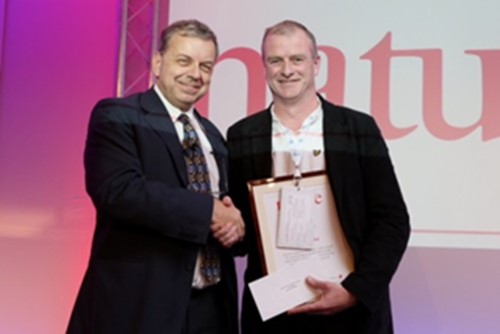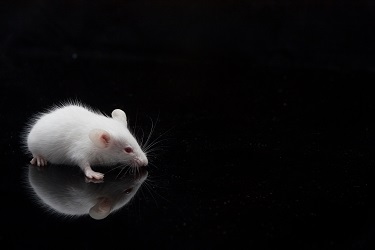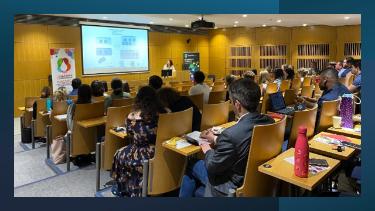SBI Principal Investigator Prof. Cormac Taylor receives prestigious Nature accolade for inspiring science students
Professor Cormac Taylor has received the 2014 Nature Award for Mentoring in Science at the Science Foundation Ireland’s 2014 Summit. These annual awards are hosted in a different country each year by Nature to champion the importance of mentoring and inspiring a generation of young scientists.
Cormac Taylor is a Principal Investigator at Systems Biology Ireland, a Fellow of UCD Conway Institute, and Professor of Cellular Physiology in UCD School of Medicine & Medical Science.
He is one of three prominent Irish scientists to be recognised by Nature and received the mid-career award and €10,000 prize. Cliona O’Farrelly, Professor of Comparative Immunology in Trinity College Dublin and Professor Martin Clynes, Director of the National Institute for Cellular Biotechnology in Dublin City University, were jointly presented with the lifetime achievement award and €5,000 each.

Editor-in-Chief of Nature, Philip Campbell (pictured presenting the award, above), said: "In an era when laboratories are under great pressure to be competitive, it is essential that they maintain the technical robustness and ethical integrity of their science, while also empowering creativity. Thus the mentoring of young researchers has never been more important. And good mentoring by laboratory heads is not a skill that can be taken for granted.”
Prof. Taylor is a leading authority in the field of hypoxia research. His laboratory has made several important contributions to the understanding of the mechanisms by which cells respond to hypoxia, and the discovery of the importance of this pathway in inflammatory bowel disease (IBD). He has also demonstrated that targeting oxygen sensitive pathways in IBD represents a new therapeutic possibility.
Former student Eoin Cummins, who is a Lecturer in Physiology at UCD, said: “Cormac is an outstanding mentor with the right blend of experience, knowledge of the business, enthusiasm, insight and generosity to allow all of those fortunate to be mentored by him to thrive in their respective careers.”
Alex Cheong, Senior Lecturer in Pharmacology at Aston University, UK, praises him as a “very fair and supportive mentor with a great personality”. Cheong hopes to emulate Prof. Taylor’s “attitude and joy for science” in his own current teaching role.
Launched in 2005, the annual Nature Awards for Mentoring in Science recognise outstanding scientific mentorship and focus on a specific country or countries each year. Nature is the leading weekly, international scientific journal.
After obtaining his PhD in pharmacology from University College Dublin, Cormac Taylor trained in Harvard Medical School for five years and since 2001 has led an independent research group.
“It is essential to realise the individuality of researchers and to tailor their mentorship accordingly,” said Prof. Taylor.
"I maintain an open door policy and feel that as a mentor, it is my duty to ensure that each person under my supervision generates the high level of scientific achievement required to pursue a successful career in international science."
Professor Cormac Taylor has successfully supervised 16 PhD students and mentored 9 postdoctoral researchers in addition to publishing over 90 articles, accumulating in excess of 4800 citations and achieving a h-factor of 44. He has maintained continuous funding through the Science Foundation Ireland investigator award programme since 2002 and has held career development awards from the Wellcome Trust and the National Institutes of Health (USA). He is an elected member of the Royal Irish Academy and conducts reviews for journals and funding agencies including Nature, Cancer Cell, PNAS, Science Foundation Ireland, Wellcome Trust and the National Science Foundation (USA).
Key Publications:
- Scholz CC, Cavadas MAS, Tambuwala MM, Hams E, von Kriegsheim A, Rodriguez-Martinez J, Cotter P, Bruning U, Fallon PG, Cheong A, Cummins EP & Taylor CT. (2013) Regulation of IL-1β-induced NF-kB activity by hydroxylases links key hypoxic and inflammatory signaling pathways. PNAS 110(46):18490-5.
- Cummins, EP, Berra, E, Comerford, KM, Fitzgerald, KT, Seeballuck, F, Godson, C, Nielsen, JE, Moynagh, P, Pouyssegur, J & Taylor, CT. (2006) Prolyl hydroxylase-1 negatively regulates IKKb giving new mechanistic insight into hypoxia-induced NFkB activity . Proc. Natl. Acad. Sci. USA 103(48): 18154-18159.
- Cummins, EP, Seeballuck, F, Keely, SJ, Mangan, NE, Callanan, JJ, Fallon, PG, & Taylor, CT. (2008) The hydroxylase inhibitor Dimethyloxalylglycine is protective in a murine model of colitis. Gastroenterology. 134; 156-165.
- Tambuwala MM, Cummins EP, Lenihan CR, Kiss J, Stauch M, Scholz CC, Fraisl P, Lasitschka F, Mollenhauer M, Saunders SP, Maxwell PH, Carmeliet P, Fallon PG, Schneider M, Taylor CT. (2010) Loss of prolyl hydroxylase-1 protects against colitis through reduced epithelial cell apoptosis and increased barrier function. Gastroenterology. 139; 2093-2101.
About Nature Publishing Group (NPG)
Nature Publishing Group (NPG) is a publisher of high impact scientific information in print and online. NPG publishes journals, online databases and services across the life, physical, chemical and applied sciences. Throughout all its businesses NPG is dedicated to serving the scientific community and the wider scientifically interested general public. www.nature.com
Focusing on the needs of scientists, Nature (founded in 1869) is the leading weekly, international scientific journal. NPG publishes a range of Nature research journals and Nature Reviews journals, and a range of prestigious academic and partner journals including society-owned publications. Online, nature.com provides over 8 million visitors per month with access to NPG publications and services, including news and comment from Nature, and the leading scientific jobs board Naturejobs.
Scientific American is at the heart of NPG's consumer media division, meeting the needs of the general public. Founded in 1845, Scientific American is the oldest continuously published magazine in the US and the leading authoritative publication for science in the general media. Together with scientificamerican.com and 14 local language editions around the world it reaches over 5 million consumers and scientists. Other titles include Scientific American Mind and Spektrum der Wissenschaft in Germany.

